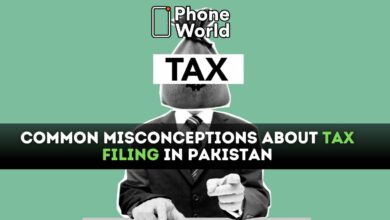Tax-Saving Tips and Tricks for Pakistani Filers: A Comprehensive Guide

Taxes are a fundamental part of a citizen’s responsibility, but nobody wants to pay more than they should. For Pakistani filers, navigating the tax landscape can seem daunting, but with the right strategies, you can minimize your tax burden while staying compliant. Here’s a comprehensive guide to tax-saving tips and tricks tailored for Pakistani filers.
Before diving into tax-saving strategies, it’s crucial to grasp the fundamentals of Pakistan’s tax system. Taxation in Pakistan is governed by the Federal Board of Revenue (FBR), which administers various taxes, including income tax, sales tax, and federal excise duty. The process of becoming a tax filer in Pakistan is also easy. But let’s discuss some important tax-saving tips and tricks for Pakistani filers.
Tax-Saving Tips and Tricks for Pakistani Filers: A Comprehensive Guide
Utilize Tax Credits and Deductions
Maximize your tax savings by taking advantage of available tax credits and deductions. Some common deductions include:
- Charitable Donations: Contributions to recognized charities or welfare organizations are eligible for deductions.
- Education Expenses: Tuition fees for yourself, your spouse, or children can be claimed for deductions.
- Insurance Premiums: Premiums paid on life and health insurance policies can be deducted from your taxable income.
- Medical Expenses: Medical bills, health insurance premiums, and expenses on certain medical treatments are deductible.
- House Rent: If you’re a salaried individual, you can claim a house rent allowance as a deduction.
- Provident Fund Contributions: Contributions to approved provident funds are eligible for tax deductions.
- Special Persons Tax Credit: The disabled persons are eligible for a tax credit.
Invest in Tax-Advantaged Schemes
Explore tax-saving investment options to optimize your savings:
- National Savings Schemes: Consider investing in National Savings Schemes (NSS) like National Savings Certificates (NSC) or Defense Savings Certificates (DSC) which offer attractive returns and tax benefits.
- Retirement Funds: Contributing to a recognized pension fund or retirement scheme can reduce your taxable income.
- Stock Market Investments: Certain investments in the stock market, such as investing in companies listed on the Pakistan Stock Exchange (PSX) for a specified duration, may offer tax benefits.
Capitalize on Tax Exemptions
Certain incomes are exempt from taxation, and understanding these exemptions can significantly reduce your tax liability:
- Agricultural Income: Income generated from agricultural sources might be exempt from income tax.
- Export Income: Income earned through exports might be eligible for tax exemptions under specific conditions.
- Government Bonds: Interest earned on certain government bonds may be exempt from income tax.
Plan for Long-Term Capital Gains
Optimize your investments for long-term gains as these are usually taxed at a lower rate than short-term gains. Holding on to assets like property, stocks, or mutual funds for more extended periods can result in reduced tax liabilities.
Get Help from a Tax Expert
Understanding tax rules can be tough. Bringing in a skilled tax consultant can make a big difference. They’ll help you save more on taxes while making sure you follow all the rules. With their guidance, you’ll get advice that fits your finances and future plans.
Provide Correct Paperwork
Make sure your tax forms are filled in right and have all the needed documents. Mistakes can cause audits, fines, or even more taxes to pay. Keep your financial records in order—things like your income, spending, investments, and deductions should all be well-organized.
Stay Informed About Tax Amendments and Policies
Tax laws are subject to change, and staying updated with the latest amendments and policies can help you leverage new opportunities for tax savings. Regularly check FBR updates and consult tax professionals to ensure you’re utilizing all available avenues for savings.
Business Expenses and Deductions
If you’re self-employed or have a side business, take advantage of legitimate business expenses:
- Home Office Deduction: If you have a dedicated space for your work at home, you might qualify for this deduction.
- Travel and Entertainment Expenses: Keep track of expenses related to your business activities.
File Your Taxes Timely and Accurately
Filing your taxes on time and accurately is key to avoiding penalties and ensuring you receive any refunds or benefits you’re entitled to. Consider using tax software or hiring a tax professional to help you with the process.
Final Words:
Navigating the tax system in Pakistan doesn’t have to be overwhelming. By employing these tax-saving tips and tricks, you can not only reduce your tax burden but also channel your savings towards securing your future through prudent investments and strategic planning. Remember, staying informed, seeking professional advice, and planning ahead are key elements to maximizing your tax savings while ensuring compliance with the country’s tax laws.
You May Also Like: Unlocking Benefits: Why Being a Tax Filer in Pakistan Matters
PTA Taxes Portal
Find PTA Taxes on All Phones on a Single Page using the PhoneWorld PTA Taxes Portal
Explore NowFollow us on Google News!





